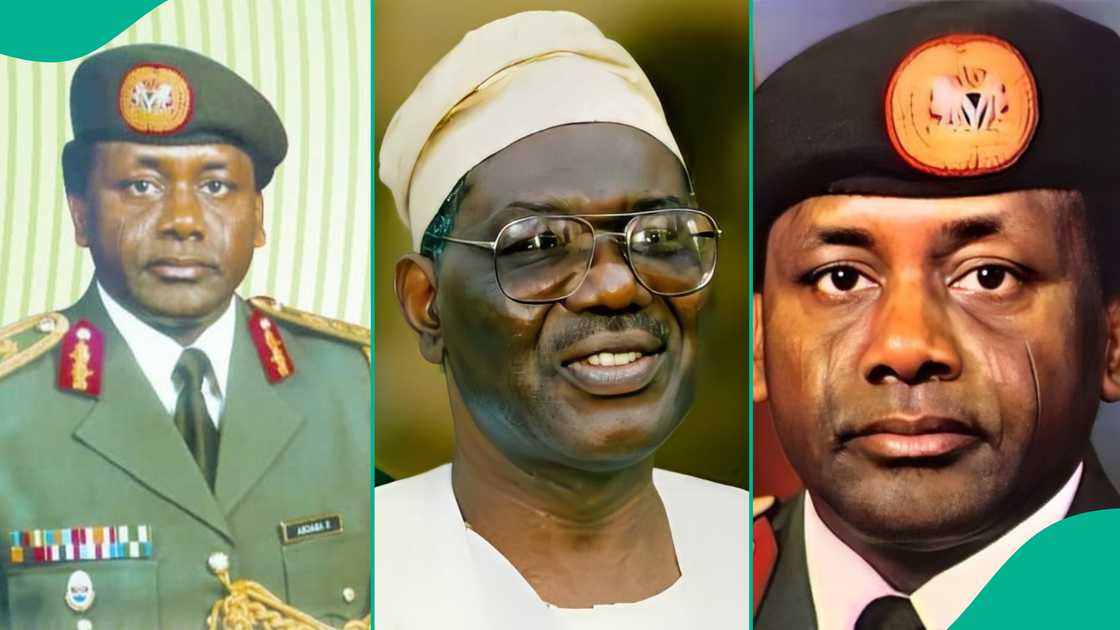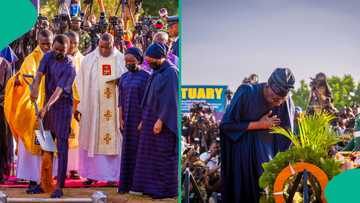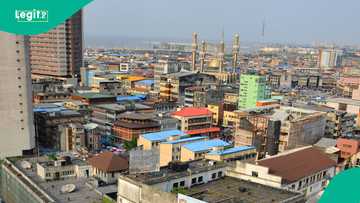31 Years Since General Sani Abacha's Coup: Last Successful Military Takeover in Nigeria Explained
- 31 years ago, General Sani Abacha's coup, which overthrew Chief Ernest Shonekan's National Interim Government, making him Nigeria's head of state
- The 1993 coup followed the annulled June 12 presidential election won by Moshood Abiola, leading to national unrest and political instability
- General Sani Abacha's takeover remains Nigeria's last successful military coup, forever altering the nation's political landscape
CHECK OUT: Education is Your Right! Don’t Let Social Norms Hold You Back. Learn Online with LEGIT. Enroll Now!
Thirty-one years ago, Nigeria witnessed a unexpected shift in its political landscape.
The winds of change swept through the corridors of power as General Sani Abacha executed a meticulously planned coup, toppling Chief Ernest Shonekan's National Interim Government.

Source: Twitter
What began as a transitional administration, birthed in the tumultuous aftermath of the Third Republic crisis, ended quickly as Abacha seized the reins of power.
Remembering Nigeria's Last Successful Military Coup
It was the dawn of November 18, 1993. The country was still reeling from the annulled June 12 presidential election, where Moshood Abiola had emerged victorious, only to see his triumph nullified by General Babangida.
The south was aflame with rioting, and unrest permeated the nation like a persistent shadow.
Shonekan, an unelected technocrat with a Harvard Business School education and a law degree, had been thrust into the role of head of the Interim National Government (ING) on August 27, 1993.
His appointment, a desperate gambit by Babangida, was met with skepticism by the public and the press alike.
The Rise of General Sani Abacha
As Shonekan struggled to steer the nation through runaway inflation and labor strikes, he appointed Abiola as his vice-president and entrusted General Sani Abacha with the role of secretary of defense.
Under Shonekan's watch, Nigeria's economic fortunes got worse.
Foreign investors, save for the steadfast oil companies, withdrew from the beleaguered nation.
Shonekan's efforts to alleviate the financial strain—seeking debt forgiveness and auditing the Nigerian National Petroleum Corporation—were commendable but insufficient to stem the tide of discontent.
The Fall of Ernest Shonekan's Interim Government
The ING's efforts to restore civil liberties and dismantle draconian laws did little to quell the rising tide of opposition from pro-democracy activists, civil society organizations, labor unions, and students.
The media's relentless campaigns against the delayed return to democracy amplified the voices of dissent, culminating in the Lagos high court nullifying Shonekan's appointment and calling for Abiola to be sworn in as president.
In the shadows, General Sani Abacha bided his time. On November 17, 1993, he moved decisively, forcing Shonekan to resign.
Sani Abacha’s Daughter Speaks on Her Dad
Meanwhile, Legit.ng earlier reported that a tweet by Gumsu, a daughter of Sani Abacha, late military head of state, on Tuesday, October 24, triggered notable reactions on X (formerly Twitter).
A page, @NigeriaStories, had asked social media users to “say something about" Late Abacha. Abacha had died in controversial circumstances in 1998, aged 54.
Source: Legit.ng




